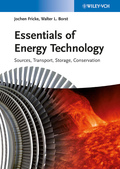Essentials of Energy Technology
Sources, Transport, Storage, Conservation

1. Edition December 2013
462 Pages, Softcover
200 Pictures
Textbook
Short Description
Developed from a proven course and written in a readily accessible, didactic style, this compact treatment covers all important energy technologies based on depletable and renewable resources, examining the carbon footprint of different energy generation technologies.
An in-depth understanding of energy technology, sources, conversion, storage, transport and conservation is crucial for developing a sustainable and economically viable energy infrastructure. This need, for example, is addressed in university courses with a special focus on the energy mix of renewable and depletable energy resources.
Energy makes our lives comfortable, and the existence of amenities such as heaters, cars, warm water, household appliances and electrical light is characteristic for a developed economy. Supplying the industrial or individual energy consumer with energy 24 hours a day is a non-trivial challenge, especially in times where the energy is coming from very diverse resources such as oil, gas, nuclear fuels, wind, sun, or waves.
This book gives physics, chemistry, engineering, and materials science students insights in the basics of energy and energy technology. It was developed along a successful course for advanced bachelor or graduate students and is written in a didactic style. The problems and solutions at the end of each chapter are ideal for exams and make self-study easy. Topics covered include energy from fossil and nuclear fuels, renewable sources, energy transport, storage, and conservation.
INTRODUCTION
Global Energy Flow
Natural and Anthropogenic Greenhouse Effect
Limit to Atmospheric CO2 Concentration
Potential Remedies
ENERGY CONSERVATION WITH THERMAL INSULATION
Opaque Insulations
Transparent and Translucent Insulations
THERMODYNAMIC ENERGY EFFICIENCY
Carnot's Law
Stirling Engine
Irreversibilities
Exergy and Anergy
Compression Heat Pumps and Air-Conditioning Systems
Absorption Heat Transformers
Energy and Exergy Efficiency
FOSSIL FUEL-FIRED ENERGY CONVERTERS
Power Plants
Internal Combustion Engines
Thermoelectric Converters (TECs)
Exotic Energy Converters
Absorption Cycles
Condensation Boilers
NUCLEAR FISSION ENERGY AND POWER PLANTS
Binding Energy and Mass Defect
Fission
The Multiplication Factor
Reactor Control
Neutron Flux
Reactivity Changes during Power Plant Operation
Fuel Conversion and Breeding
Nuclear Reactor Types
The Fuel Question
U235 Enrichment
Spent Fuel
Reactor Safety and Accidents
HYDROPOWER
Water Runoff from Mountains
Laminar and Turbulent Flow in Pipes
Running Water from Oceans
Ocean Tides
Ocean Waves
Ocean Thermal Energy Conversion (OTEC)
Energy from Osmotic Pressure
WINDPOWER
Wind Velocity
Using the Drag
Using the Lift
Technical Questions
Electricity from Wind on Demand
Small-Scale Wind Energy Conversion
Alternative Wind Energy Converters
Wind Energy Concentration
PHOTOVOLTAICS (PV)
Diodes and Solar Cells
Transport Phenomena, Isc and Uoc
Temperature Effects
Equivalent Circuit
Absorption Process and Transitions
Advanced Solar Cells
Si Production and Energy Amortization
Other Solar Materials
From Solar Cells to Modules
Future Prospects for Photovoltaics
Wet Solar Cells
SOLAR SPACE AND HOT WATER HEATING
Solar Radiation
Flat Plate Collectors
Evacuated Thermal Collectors
Compound Parabolic Concentrator (CPC)
Solar Thermal Heating Systems
Active Solar Heating Systems
Thermosiphon
ELECTRICITY AND FUELS FROM SOLAR HEAT
Concentration of Solar Radiation
Solar Troughs
Fresnel Systems
Solar Dish and Solar Tower
Solar Thermic Power Plants
Solar Fuels
BIOMASS ENERGY
Growth of Biomass
Direct Use of Solid Biomass
Biogas
Biofuel
Hydrothermal Carbonization of Biomass
GEOTHERMAL ENERGY
The Origin of Geothermal Energy
Geothermal Anomalies
Geothermal Power Plants
Hot Dry Rock
ENERGY STORAGE
Mechanical Energy Storage
Electric Energy Storage
Electrochemical Energy Storage
Chemical Energy Storage
Thermal Energy Storage
ENERGY TRANSPORT
Mechanical Energy Transport
Transporting Electricity
Heat Transport
FUEL CELLS
General Considerations
Polymer Electrolyte Membrane Fuel Cell (PEMFC)
Solid Oxide Fuel Cell (SOFC)
Other Fuel Cells
NUCLEAR FUSION ENERGY
Introduction
Fuel for Fusion
Break-Even and the Lawson Criterion
Magnetic Confinement Fusion (MCF)
International Thermonuclear Experimental Reactor (ITER)
Inertial Confinement Fusion (ICF)
The National Ignition Facility (NIF)
Walter Borst is Professor Emeritus of Physics at Texas Tech University, Lubbock, where he still teaches. He joined the University as department chairman in 1984. Before coming to Texas he was Professor of Physics at Southern Illinois University, Carbondale. In Illinois he also served as chairman of the advisory board of the Illinois Energy Resources Commission. Borst received his Ph. D. in Physics from the University of California at Berkeley in 1968 with a specialty in atomic and molecular physics. He then went to the University of Pittsburgh as a postdoctoral fellow. Before coming to the United States he received his Diplom in Physik from the University of Tübingen, Germany, in nuclear physics. His main research has been in atomic collisions and time-resolved laser-induced fluorescence for materials characterization, and in renewable energy, especially solar heat collectors and long-term solar heat storage. During his professional career Borst served in a variety of scientific organizations. He recently received the Distinguished Service Award from the Texas Section of the American Physical Society.


